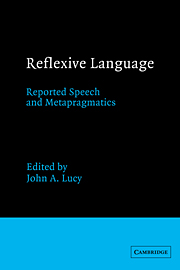Book contents
- Frontmatter
- Contents
- Acknowledgments
- General introduction
- Part I Theoretical foundations
- Introduction to Part I
- 1 Reflexive language and the human disciplines
- 2 Metapragmatic discourse and metapragmatic function
- Part II The relation of form and function in reflexive language
- Part III Text, context, and the cultural functions of reflexive language
- Part IV Interpretation, reported speech, and metapragmatics in the Western tradition
- Name index
- Subject index
Introduction to Part I
from Part I - Theoretical foundations
Published online by Cambridge University Press: 22 January 2010
- Frontmatter
- Contents
- Acknowledgments
- General introduction
- Part I Theoretical foundations
- Introduction to Part I
- 1 Reflexive language and the human disciplines
- 2 Metapragmatic discourse and metapragmatic function
- Part II The relation of form and function in reflexive language
- Part III Text, context, and the cultural functions of reflexive language
- Part IV Interpretation, reported speech, and metapragmatics in the Western tradition
- Name index
- Subject index
Summary
Part I, “Theoretical foundations,” provides contextual and theoretical background for the volume. In Chapter 1, Lucy provides a general, nontechnical overview of existing research on reflexive language. He first illustrates the range of language forms and uses that have been seen as reflexive. Then he outlines the distinctive orientations and contributions of three major research traditions which have explored this reflexivity. The logico-linguistic tradition formulates a metalanguage/object language distinction to resolve difficulties in the philosophical analysis of the truth value of symbolic referential uses of language. The semiotic—functional tradition foregrounds the centrality of metacommunicative framing for all language use. And the literary—performance approaches emphasize the use of reflexivity in language and especially in verbal art to establish and transform existing contexts. En route, many of the basic concepts and theoretical ideas employed in other papers in the volume are clarified and located conceptually and historically. The chapter concludes by indicating the broader significance of studies of reflexive language within the human disciplines. This discussion focuses in particular on the significance of various semiotic limits to awareness and their implications for research in the human disciplines.
In Chapter 2, Silverstein, building on his previous work, develops a formal statement of the various theoretical issues at stake in a theory of metasemiotic practice.
Information
- Type
- Chapter
- Information
- Reflexive LanguageReported Speech and Metapragmatics, pp. 7 - 8Publisher: Cambridge University PressPrint publication year: 1993
